Schleswig, Schleswig-Holstein
Schleswig (UK: /ˈʃlɛsvɪɡ/, US: /-wɪɡ, -wɪk, -vɪk, ˈʃleɪsvɪk/,[2][3][4][5] German: [ˈʃleːsvɪç] ⓘ; Danish: Slesvig; South Jutlandic: Sljasvig; Low German: Sleswig) is a town in the northeastern part of Schleswig-Holstein, Germany. It is the capital of the Kreis (district) Schleswig-Flensburg. It has a population of about 27,000, the main industries being leather and food processing. It takes its name from the Schlei, an inlet of the Baltic sea at the end of which it sits, and vik or vig which means "bay" in Old Norse and Danish. Schleswig or Slesvig therefore means "bay of the Schlei".
Schleswig
| |
|---|---|
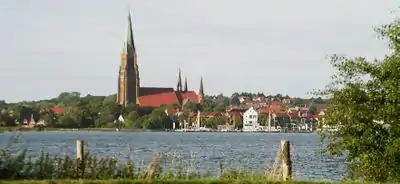 St. Peter's Cathedral | |
 Flag  Coat of arms | |
Location of Schleswig within Schleswig-Flensburg district 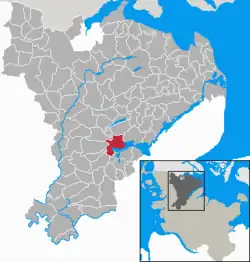 | |
 Schleswig 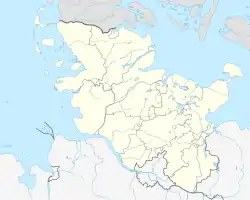 Schleswig | |
| Coordinates: 54°31′07″N 9°33′55″E | |
| Country | Germany |
| State | Schleswig-Holstein |
| District | Schleswig-Flensburg |
| Government | |
| • Mayor | Stephan Dose |
| Area | |
| • Total | 24.3 km2 (9.4 sq mi) |
| Elevation | 1 m (3 ft) |
| Population (2021-12-31)[1] | |
| • Total | 25,510 |
| • Density | 1,000/km2 (2,700/sq mi) |
| Time zone | UTC+01:00 (CET) |
| • Summer (DST) | UTC+02:00 (CEST) |
| Postal codes | 24837 |
| Dialling codes | 04621 |
| Vehicle registration | SL |
| Website | www.schleswig.de |
History
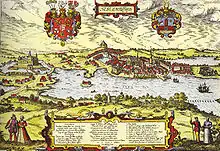
The Viking settlement of Hedeby, located south of the modern town, was first mentioned in 804. It was a powerful settlement in the Baltic region, dominating the area for more than 200 years. In 1050, following several destructions, the population was moved to the opposite shore of the Schlei, becoming the city of Schleswig. In 1066 Hedeby was finally destroyed, and Schleswig remained a part of the Danish kingdom.
In 1544, Gottorf Castle became the residence of the local rulers. The dukes of Gottorf were vassals of the Danish kings and ruled over much of present-day Schleswig-Holstein. In 1721, when the Great Northern War ended, the dukes of Gottorf lost their power and their land became Danish crown land. After the Second Schleswig War (1864), Schleswig was annexed by the Kingdom of Prussia.
Geography
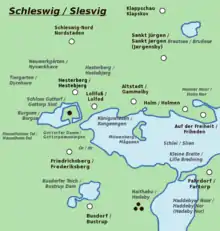
Schleswig lies at the western end of the Schlei Förde, which separates the two peninsulas of Angeln and Schwansen, and is on the western edge of the Schleswig-Holstein Uplands on the transition to the Geest country. The urban area ranges from 0 to 20 m (66 ft) above sea level. Brautsee (lake) is in the town.
The nearest major cities are Flensburg, Husum and Kiel. Autobahn 7 runs immediately west of the city. Highways 76 and 77 end in Schleswig and B 201 runs to the north of the town. Schleswig station is a stop for InterCity and Intercity-Express trains and is on the Hamburg–Neumünster–Flensburg and Husum–Kiel lines.
Climate
The climate is oceanic (Köppen: Cfb), humid and mild with a slight continental influence.[6] The annual mean temperature is 8 °C and precipitation averages 925 mm.[7]
| Climate data for Schleswig (1991–2020 normals) | |||||||||||||
|---|---|---|---|---|---|---|---|---|---|---|---|---|---|
| Month | Jan | Feb | Mar | Apr | May | Jun | Jul | Aug | Sep | Oct | Nov | Dec | Year |
| Record high °C (°F) | 11.7 (53.1) |
14.3 (57.7) |
20.2 (68.4) |
25.7 (78.3) |
27.6 (81.7) |
30.5 (86.9) |
31.1 (88.0) |
32.0 (89.6) |
29.3 (84.7) |
23.9 (75.0) |
17.8 (64.0) |
13.7 (56.7) |
32.0 (89.6) |
| Average high °C (°F) | 3.7 (38.7) |
4.3 (39.7) |
7.6 (45.7) |
12.6 (54.7) |
16.8 (62.2) |
19.7 (67.5) |
22.1 (71.8) |
21.9 (71.4) |
18.0 (64.4) |
12.8 (55.0) |
7.7 (45.9) |
4.6 (40.3) |
12.6 (54.7) |
| Daily mean °C (°F) | 1.7 (35.1) |
1.9 (35.4) |
4.0 (39.2) |
7.9 (46.2) |
11.9 (53.4) |
15.0 (59.0) |
17.3 (63.1) |
17.1 (62.8) |
13.8 (56.8) |
9.6 (49.3) |
5.4 (41.7) |
2.7 (36.9) |
9.0 (48.2) |
| Average low °C (°F) | −0.5 (31.1) |
−0.5 (31.1) |
1.0 (33.8) |
3.8 (38.8) |
7.2 (45.0) |
10.5 (50.9) |
12.9 (55.2) |
13.0 (55.4) |
10.3 (50.5) |
6.7 (44.1) |
3.1 (37.6) |
0.6 (33.1) |
5.6 (42.1) |
| Record low °C (°F) | −16.6 (2.1) |
−18.0 (−0.4) |
−13.7 (7.3) |
−4.4 (24.1) |
−1.1 (30.0) |
2.2 (36.0) |
5.6 (42.1) |
6.0 (42.8) |
2.3 (36.1) |
−2.4 (27.7) |
−11.5 (11.3) |
−18.1 (−0.6) |
−18.1 (−0.6) |
| Average precipitation mm (inches) | 81.3 (3.20) |
61.4 (2.42) |
58.4 (2.30) |
41.7 (1.64) |
56.1 (2.21) |
76.3 (3.00) |
92.9 (3.66) |
90.4 (3.56) |
81.0 (3.19) |
89.8 (3.54) |
75.0 (2.95) |
86.1 (3.39) |
890.4 (35.06) |
| Average precipitation days (≥ 1.0 mm) | 19.1 | 16.6 | 16.6 | 13.0 | 13.8 | 15.1 | 15.6 | 16.5 | 16.3 | 18.1 | 19.1 | 19.8 | 199.6 |
| Average snowy days (≥ 1.0 cm) | 7.4 | 7.5 | 4.1 | 0.2 | 0 | 0 | 0 | 0 | 0 | 0 | 0.8 | 4.5 | 24.5 |
| Average relative humidity (%) | 89.9 | 87.3 | 82.7 | 76.4 | 74.8 | 76.0 | 76.9 | 79.0 | 83.3 | 86.5 | 90.0 | 91.2 | 82.8 |
| Mean monthly sunshine hours | 43.7 | 62.8 | 119.7 | 186.0 | 234.7 | 220.9 | 226.6 | 207.8 | 148.5 | 101.7 | 54.4 | 37.2 | 1,646.4 |
| Source: World Meteorological Organization[8][7] | |||||||||||||
Sights

- Schleswig Cathedral (1134), with the tomb of King Frederick I of Denmark
- Gottorf Castle (built 1161), former residence of the dukes, with the baroque Neuwerk garden, containing a replica of the Globe of Gottorf
- Holm: old fishing village at the Schlei shore
- Hedeby, Viking settlement
Twin towns – sister cities
 Hillingdon, England, United Kingdom
Hillingdon, England, United Kingdom Mantes-la-Jolie, France
Mantes-la-Jolie, France Vejle, Denmark
Vejle, Denmark Waren, Germany
Waren, Germany
Notable people
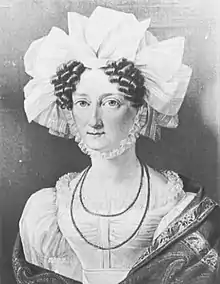
.jpg.webp)
.jpg.webp)
- Valdemar I of Denmark (1131–1182), King of Denmark from 1154 until his death in 1182.[10]
- Christian III of Denmark (1503–1559), King of Denmark [11]
- Adolf Frederick, King of Sweden (1710–1771), King of Sweden [12]
- Frederick August I, Duke of Oldenburg (1711–1785), nobleman
- Asmus Jacob Carstens (1754–1798) a Danish-German painter, committed to German Neoclassicism.[13]
- Princess Louise Caroline of Hesse-Kassel (1789–1867), matriarch of the House of Schleswig-Holstein-Sonderburg-Glücksburg
- Herman Wilhelm Bissen (1798–1868), Danish sculptor
- Friedrich Bernhard Westphal (1803–1844), German-Danish genre painter and illustrator
- Karl Friedrich Wilhelm Jessen (1821–1889), botanist
- Frederick VIII, Duke of Schleswig-Holstein (1821–1889), patriarch of the House of Schleswig-Holstein-Sonderburg-Augustenburg
- Friedrich Krichauff (1824–1904), politician in colonial South Australia
- Victor Hensen (1835–1924), zoologist
- Ove H. Berg (1840–1922), American politician and businessman, emigrated to the US in 1881
- Julius Friedrich Theodor Engel (1842–1926), judge and politician
- Hans von Seeckt (1866–1936), military officer
- Ulrich von Brockdorff-Rantzau (1869–1928), politician and diplomat, first Foreign Minister of the Weimar Republic
- Christian Hansen (1885–1972), general
- Hermann-Bernhard Ramcke (1889–1968), General of paratroop forces
- Bernhard Rogge (1899–1982), naval officer
- Bernd Kröplin (1944–2019), engineer and academic
- Ralf Rothmann (born 1953), novelist
- Thomas Heberer (born 1965), musician and composer
- Ekkehard Wölk (born 1967), pianist, arranger and composer
Sport
- Jobst Hirscht (born 1948), athlete who competed mainly in the 100 metres
- Hole Rößler (born 1949), modern pentathlete
- Jan-Ingwer Callsen-Bracker (born 1984), footballer
References
- "Bevölkerung der Gemeinden in Schleswig-Holstein 4. Quartal 2021" (XLS) (in German). Statistisches Amt für Hamburg und Schleswig-Holstein.
- "Schleswig". The American Heritage Dictionary of the English Language (5th ed.). HarperCollins. Retrieved 13 April 2019.
- "Schleswig". Collins English Dictionary. HarperCollins. Retrieved 13 April 2019.
- "Schleswig" (US) and "Schleswig". Lexico UK English Dictionary. Oxford University Press. Archived from the original on 2021-11-02.
- "Schleswig". Merriam-Webster.com Dictionary. Retrieved 13 April 2019.
- "Schleswig, Germany Köppen Climate Classification (Weatherbase)". Weatherbase. Retrieved 2019-01-28.
- "Schleswig (10035) - WMO Weather Station". NOAA. Retrieved January 28, 2019. Archived January 28, 2019, at the Wayback Machine
- "World Meteorological Organization Climate Normals for 1991–2020". World Meteorological Organization Climatological Standard Normals (1991–2020). National Oceanic and Atmospheric Administration. Archived from the original on 12 October 2023. Retrieved 13 October 2023.
- "Stadt Schleswig: Haushaltssatzung" (PDF). schleswig.de (in German). Schleswig. 2019. p. 101. Retrieved 2021-03-09.
- Bain, Robert Nisbet (1911). . Encyclopædia Britannica. Vol. 27 (11th ed.). pp. 840–841.
- . Encyclopædia Britannica. Vol. 06 (11th ed.). 1911. p. 276.
- . Encyclopædia Britannica. Vol. 01 (11th ed.). 1911. pp. 211–212.
- . Encyclopædia Britannica. Vol. 5 (11th ed.). 1911. p. 411.
External links
- Official website (in German)
- . Encyclopædia Britannica. Vol. 24 (11th ed.). 1911. p. 334.
- . Encyclopædia Britannica. Vol. 32 (12th ed.). 1922.
- . Encyclopedia Americana. 1920.
- . Collier's New Encyclopedia. 1921.